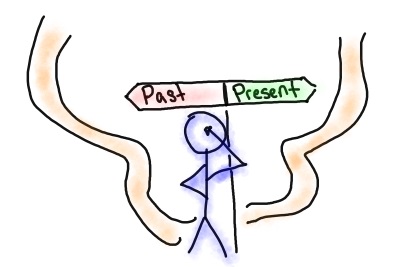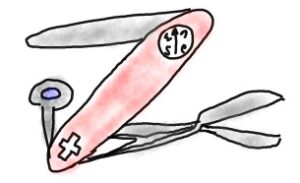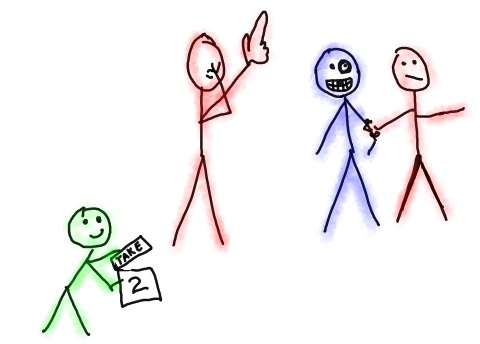“Sometimes you have to write longer. Sometimes you have to give more details than 250 words will allow. Sometimes you have to write more to get all of your thoughts out. Sometimes you can’t just use bold and bullets to make your point.”
That’s true.
Create clear, concise, conversational content.
“Sometimes you have to write longer. Sometimes you have to give more details than 250 words will allow. Sometimes you have to write more to get all of your thoughts out. Sometimes you can’t just use bold and bullets to make your point.”
That’s true.
(195 words, 45-second read)

Humor is a powerful thing. It can make your writing more engaging, relatable, and persuasive.
When used correctly:
Yeah, but: If you’re not sure how to use humor in your writing, here are a few tips:
In action: What did the ocean say to the beach?
Get it? The ocean can’t say anything…and the water…I crack myself up.
Now go: Be humorous.
Fun fact: The first draft of this post was 404 words.
(167 words, 39-second read)

When talking about writing, nouns, verbs, adverbs, propositions, and commas get a lot of play. Not so much for verb tenses.
Why it matters: According to Jonah Berger’s new book, Magic Words, the tense – past or present – can impact your persuasiveness.
After analyzing a million online reviews, Jonah’s team determined:
Past tense does us a couple of things:
Present tense gives us a different impression:
In action 🎬:
Bottom line: Writing in the present tense increases the chance of our audience reading our stuff.
Fun fact: This section of the book was about 1,200 words.
Another fun fact: The first draft was 200 words.
(185 words, 43-second read)

I bumped into the term Psychological Capital, or PsyCap, in an article. It’s the ability of a person to stay positive when a bunch of sh stuff is coming at you.
It’s like a mental Swiss Army knife to help level-up your game. Let’s look at the tools:
Okay, I don’t think a Swiss Army knife has a rubber band. But it should. So, I used the other three tools to make it so.
Why it matters: I don’t know. I just simplified a complicated psychological term. What are you working on that needs to be simplified for your audience?
Fun fact: The first draft was 339 words.
(120 words, 28-second read)

While doing my weekly planning this morning, I realized I measure my key results (OKR) in five-week increments.
Not a coincidence: I’ve been an online university instructor for the past seven years. The courses are five weeks. Or, as I call them, five-week sprints.
Before that, my life ran five-week sprints because of my real estate business. It usually took about five weeks to close, I only did five-week listings, and we held our team meetings every five weeks.
Why this matters: You can commit to anything in a five-week sprint.
Time for action: Pick a thing. And do a five-week sprint. What do you have to lose?
Fun fact: The first draft was 123 words.
(200 words, 47-second read)

“I just wanted to thank you for your feedback. I know I can get a little wordy, so those examples really helped.”
Context: That’s what a student said when he called me a few days ago. And he didn’t say it in that weird tone that drips with insincerity. So:
There’s more: That’s not even the best thing he said. Just before hanging up, he said – and I swear I didn’t pay him to say this –
What he meant was I write like I talk. Which, of course, is always my goal.
I had to ask: I thanked him for the kind words. But I couldn’t just let that go. I asked what he meant by that. He said:
1 BIG thing: Remember. Even when you think they’re not paying attention to your writing and tone – or when you aren’t paying attention to your writing and tone – THEY are.
Fun fact: The first draft of this was 179 words.
(167 words, 39-second read)

For the past few days, I’ve lived in the dark ages.
What happened: We just got the dishwasher a couple of weeks ago, and it kept giving us a code that it was leaking. So it shut down.
The repair guy fixed it. Apparently, the axial plane had broken. The sensor detected an irregular amount of water, causing the override to engage and shut the machine down.
He saw I had not brushed up on basic stoichiometry before he arrived. So, he said:
Flashback: It reminded me of a book by Randall Munroe, Thing Explainer: Complicated Stuff in Simple Words.
Be careful ⚠️: I know. Those things are waaaaay more complicated than that. But often, we write stuff that is easy to understand.
Fun fact: The first draft was 233 words.
(197 words, 46-second read)

A colleague asked me, “I always get positive comments from the students about you. But this term was off the chart. What’s the one thing you do that causes that?”
Sidebar: I actually have a point. And I am not telling you this to brag. Buuut…¯\_(ツ)_/¯
One thing: It’s my fault that she said one thing because she knows I constantly bang on the one thing drum.
Not one thing: I told her, “In this case, it’s not one thing. It’s a combination of all the things.”
Reality check: For some, maybe the only thing you have to make yourself likable is your writing. Which is another reason I am here.
Gut punch 🥊: But for most, I’ll bet you have LOTS of points of contact. So, you might be a persuasive – or even likable – writer.
Take action🎬: Check yourself. Are you being congruent in all your channels of communication?
Fun fact: The first draft of this was 473 words. Yeah. A lot was lipstick.
(134 words, 31-second read)

Even if they’re off-topic.
Of note: This is one of the rules of likable writing.
I’m kidding. I made that up. As I mentioned before, I don’t know what the rules are. That’s why I am here.
Anywho…
The point: I’ve mentioned that I read Smart Brevity and have been implementing it like crazy. While looking at my notes, I pulled this quote:
💭Thought bubble: This is a great fantastic philosophy for writing. But it could also work for other areas of your life to:
In action: Be monk-like in your discipline with your consumption of food. Be Zen-like in your inner joy of only single-ingredient foods.
That’s all. Now you go.
Fun fact: I wrote this on my iPad and forgot to get the word count on the first draft.
(207 words, 48-second read).

I wrote about the power of storytelling here. And I did it by telling a story.
One big thing I wanted you to take away from that post was people remember stories better than facts alone, especially if they’re under stress. Hence the name and choice of story.
Yes, and: So, while I hope that message was clear, I also shared something I want to revisit with you.
I told you about my intimate “conversation” with the SERE instructor in the first sentence. Then I went on to tell you the rest of the story and why it mattered.
Wasn’t me: I wish I could say I thought of that. But I am not that smart. Good storytellers use this technique because it gives the reader perspective and context while building suspense.
Truth bomb 💣: Admit it. After the first line, you had to keep reading. If for no other reason than to see why this guy beat me up.
Take action: Don’t find someone to waterboard you three times. But try this technique out the next time you tell a story.
Fun fact: The first draft was 362 words.